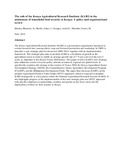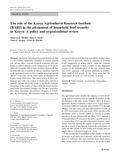| dc.description.abstract | The Kenya Agricultural Research Institute (KARI)
is a government organization mandated to conduct research
into, among others, crop and livestock production and marketing.
In 2009, it launched a new strategic plan for the period
2009–2014, together with its implementation framework. This
strategic plan aims to position KARI as a facilitator of growth
in the agricultural sector in order to enable an average growth
rate of 7 % per year over the next 5 years, as stipulated in the
Kenya Vision 2030 policy. This paper reviews KARI’s new
strategic plan within the context of recent policy reforms at
national, regional and global levels. It specifically examines
the strategy in the context of Vision 2030, the Kenya Agricultural
Sector Development Strategy (ASDS), the Comprehensive
Africa Agriculture Development Program (CAADP),
and the Millennium Development Goals. The paper then
discusses KARI’s newly adopted Agricultural Product Value
Chain (APVC) approach, which is expected to position
KARI strategically as a key player within the National
Agricultural Research System (NARS). It also highlights
progress in the implementation of the new strategic plan
and APVC approach with specific emphasis on partnerships,
markets and gender as key focus areas and the
implications of these on food security in Kenya. | en |


